Liechtenstein: The Alps’ last monarchy is a tiny slice of royal beauty

TRIESEN, Liechtenstein — The big van rumbled up the Austrian road, the craggy, jagged Alps stretching to our right like a snowy curtain. Austria laid out behind us. Switzerland stood to the right of us. Ahead I saw a ramshackle wooden shack. It consisted of one room. A small wooden bench was at its side. A flagpole held no flag. It looked like an abandoned tool shed. Nope.
It was a border patrol office.
“Here,” my host said, “is Liechtenstein.”
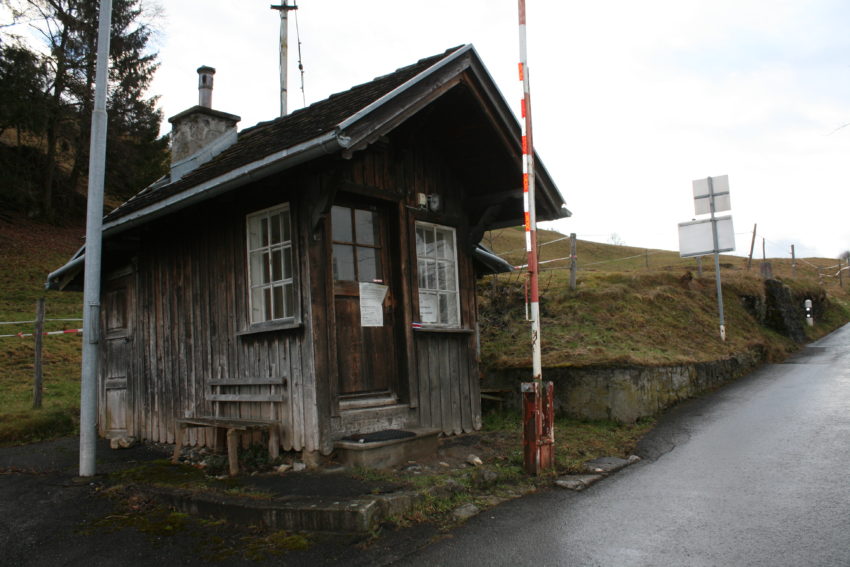
I was about to enter my 99th country (Yes, I count Scotland and Wales, British nationalists be damned.). I am here because I can easily get my hands and thoughts around small countries and I’ve seen pictures of Liechtenstein’s unspoiled mountain scenery, dating all the way back to my days collecting stamps in grade school.
Primarily, however, I’m here because of a twisted knee.
I originally scheduled a magazine story on Mikaela Shiffrin, Colorado’s Olympic gold medalist skier who was going to race one of the biggest slaloms of the season Tuesday in Flachau, Austria. However, she partially damaged her medial collateral ligament during training in Sweden last month and is likely out for the season. Mile High Sports magazine cancelled the story. Lufthansa, Europe’s Nazi airline, wouldn’t let me change my flight to Munich. Not the destination. Not the dates. Nothing. So I came anywhere. But instead of going to Austria, I went to Liechtenstein.
Shiffrin’s pain is my gain.

Liechtenstein’s border crossing closed 10 years ago but occasionally it hoists the flag and mans the shack to keep tourists honest. Liechtenstein, like neighboring Switzerland, is not a member of the European Union. You need a passport to enter. Monday I didn’t need one.
My passport was Herbert Aichhlozar, my host in my AirBnB.
“You’re the first person I’ve ever met from Liechtenstein,” I told him when he picked me up at the train station after a three-hour train ride to Feldkirch, Austria, “The Gateway to Liechtenstein.” Herbert smiled. He gets that a lot. He’s a short, stocky fit man with a bald pate. His happy face is void of wrinkles which bely his 60 years. In a place this small with this much money — average annual income is 81,500 Swiss francs a year (about $81,000) and unemployment is 2 percent — I can think of one popular activity.
“I never have problems here in Liechtenstein,” he said. “So it’s paradise.”
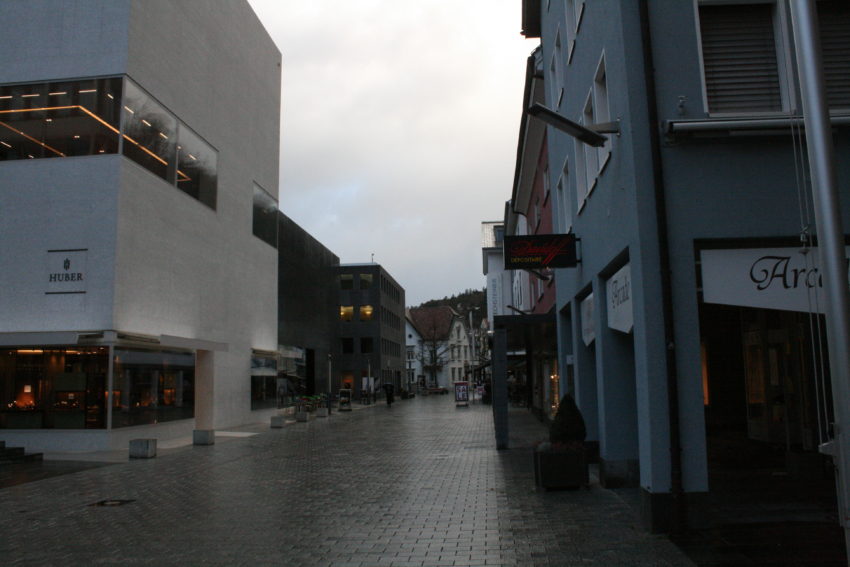
Herbert was born, raised, educated and still lives in Liechtenstein. He’s one of 37,000 Liechtensteiners (ironically, Shiffrin’s manager, Kilian Albrecht, is one of them) who are scattered among 11 villages. Vaduz, the postcard-cute capital, has all of 5,300 people.
The first thing you must know about Liechtenstein is how to pronounce it. Just imitate a cat coughing up a furball: LEEEECCCHHHHT-en-stein.The fourth smallest country in Europe is all of 62 square miles, the size of Staten Island. From one end to the other is 17 miles. It’s nine miles wide. Driving from one end to the other takes 25 minutes. It takes that long to get out of Heathrow Airport. Yet it still has 240 miles of well-marked hiking trails.
A few things you didn’t know about Liechtenstein. If you did, you need to get out more. Liechtenstein has:
No airport
No military
One train station
One ski resort
One hospital
One TV channel
One radio station
Two newspapers
Internationally, Liechtenstein is best known for some of the most beautiful postage stamps in the world and a tax scandal that made it sound as if every drug lord in the Western Hemisphere had a mountain chalet here.
Instead, it should be known for mountain scenery that is nothing short of breathtaking. As we climbed the windy road to Herbert’s town just south of Vaduz, to our right the Alps seemed to get higher with us. The Alps haven’t received much snow lately but the black craggy mountains provided a pretty backdrop to the gingerbread villages and green farm land in the foreground. The country is tucked between Switzerland and the long, western arm of Austria like a very small paper clip. The mountains I’m seeing are actually in Switzerland but the Liechtensteiners are happy to borrow the view. Liechtenstein’s mountains are over the hill to our left.
Herbert seemingly knows everyone in the country. He waved at three motorists as we drove the 15 minutes to his home. As we drive through Vaduz, I see the basic framework of what has made Liechtenstein.
Banks, banks and more banks. Vaduz is lined with them. Liechtenstein has one of the lowest corporate tax rates in the world at 12.5 percent. In the late 1970s, the country used it to lure corporations. They parlayed that into the third highest gross domestic product in the world behind Qatar and Luxembourg. Today 73,000 holding companies have registered offices in Liechtenstein. The taxes generated provide 30 percent of Liechtenstein’s revenue.
That included a 2008 scandal in which numerous companies in Germany, the U.S. and Great Britain were investigated for avoiding local taxes by registering in Liechtenstein. Liechtenstein officials never asked questions. They do now.
But there are plenty of other legitimate businesses. Liechtenstein is the world’s largest producers of false teeth. Hilti, which makes drilling machines, employs 300,000 people around the world.
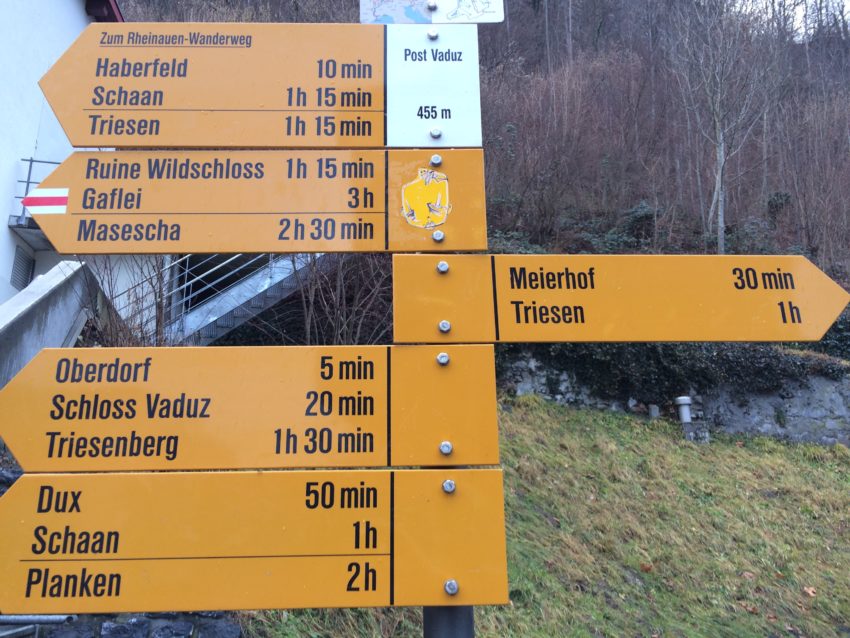
The only other things big in Liechtenstein are the mountains. Everything else is small. It has only 40 police officers. One of them runs one of the country’s two breweries.
“When he finishes his work as a policeman, he goes and makes beer,” Herbert said.
He said this as the time nears 5 p.m.
“This is rush hour,” he said. There were two cars ahead of us. Herbert wasn’t laughing. This was no joke.
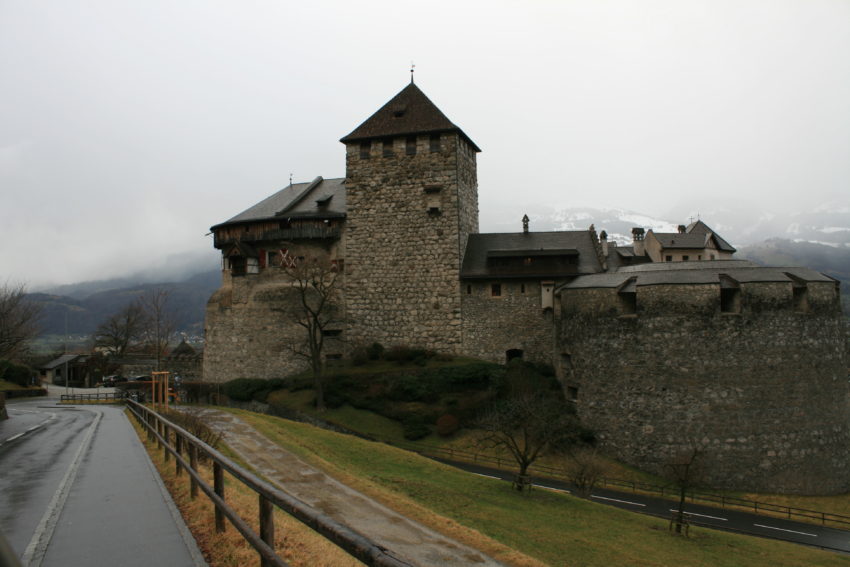
Above us, the Prince of Liechtenstein’s 12th century castle stuck up over Vaduz. It’s steel gray and looks made of spare car parts but the large tower gives it the air of royalty. Liechtenstein is the last monarchy in the Alps yet it’s different. Prince Alois, 47, can often be seen jogging through downtown, grabbing a pizza or getting his hair cut. Everyone I met over three days in Liechtenstein has met the prince. I’ve never met a person who has even SEEN the Queen of England.
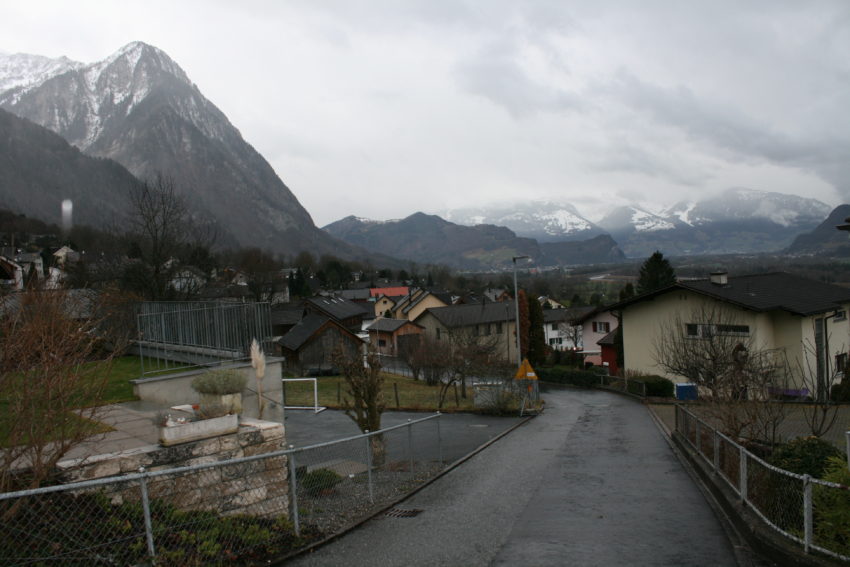
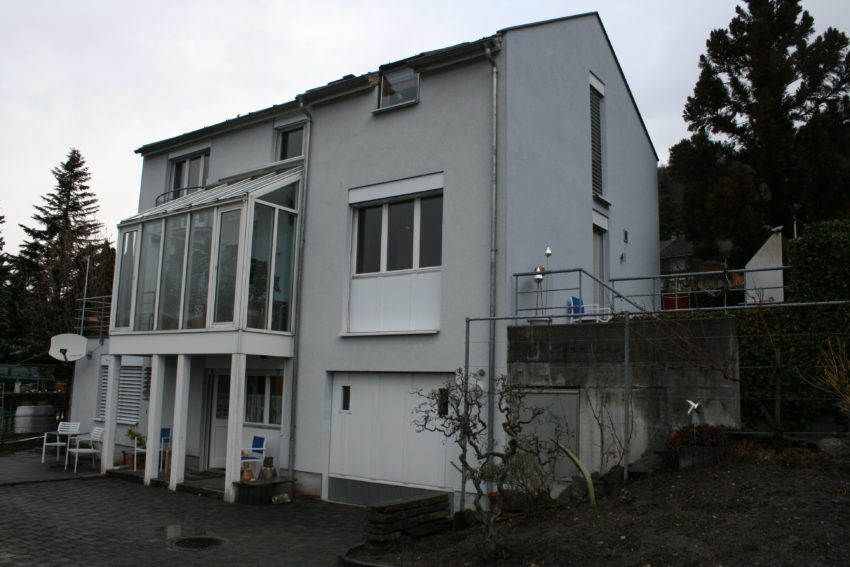
Herbert’s house is a split level home with great views of the Alps. I had the downstairs with a double bed, modern bathroom, fully stocked mini-fridge and a flat-screen TV with CNN, BBC and yes, Liechtenstein’s one channel, 1FLTV. Framed children’s drawings and African prints dot the walls.
I asked Herbert about Liechtenstein’s one national dish. It has the tongue-twirling name of kasknopfle, which I’ve read are “cheese noodle dumplings.” Herbert knows just where to go. Wirthfchaft Zum Lowen (wirthfchaft is “restaurant” in Liechtenstein’s Alemannic dialect, which is similar to Swiss German and has the sing-song sound of two actors in “Fargo” speaking Norwegian) is two big bright rooms with wooden floors and yellow tablecloths. The two waitresses wore long, low-cut dresses that looked like native garb you’d see pictured on a beer stein. If you designed the perfect dish for being snowed in, kasknopfle would be it. It’s a big pile of short noodles and covered in two cheeses. Throw on some shaved fried onions and add a side of warm applesauce and you have the perfect mountain dish. It isn’t cheap. It’s 22 euros but at Zum Lowen it’s also all you can eat. The waitress came over to me twice until I could barely walk to the kitchen to photograph her smiling husband, the co-owner and cook, Myriam.
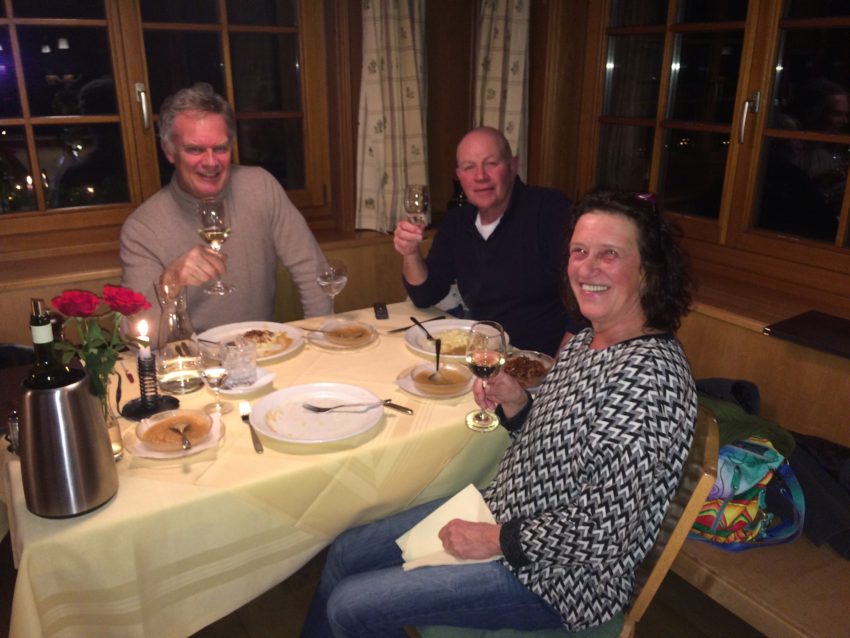
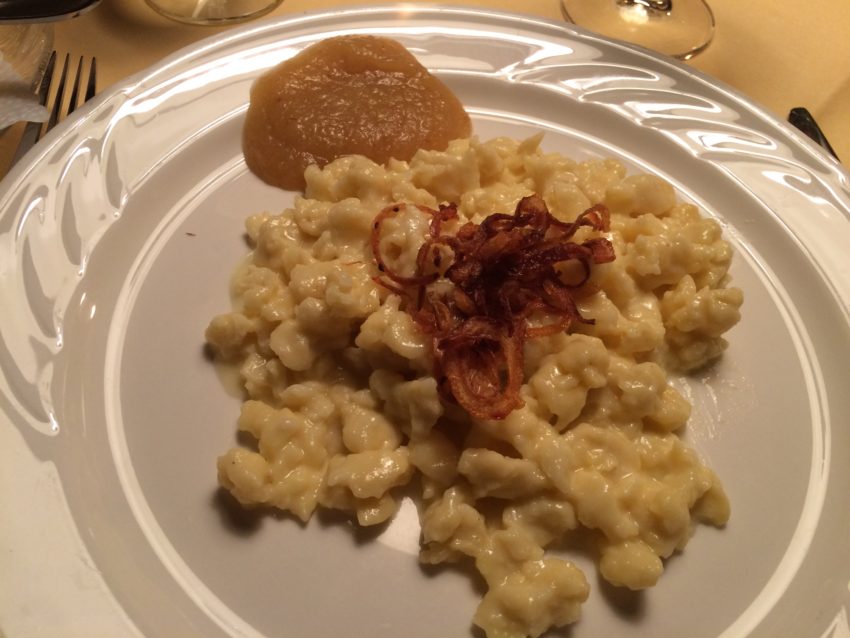
Herbert and his wife, Ursi, say hi or, in Liechtenstein dialect, “Hoi!” to seemingly everyone in the restaurant. This is a small country with a small-town feel I often felt in the rural Midwest of the United States. That has its drawbacks. One local told me, “Everyone knows everyone and everyone knows what everyone else is doing.” Imagine going on a first date with a woman and, before you get home, your ex-girlfriend on the other end of the country hears about it.
That brought up the one question that nagged me over my three-day stay. In a world crumbling from the weight of terrorism, racism and financial collapse, Liechtensteiners do nothing but smile. In a country this size, this rich, this clean (you can eat off the floor of the public bathroom below the post office), I kept asking one question: What is Liechtenstein’s biggest problem?
***
I asked Herbert this as he gave me a tour of the country — the WHOLE country — on Tuesday MORNING. The tax scandal has had a lasting effect on the economy. Businesses ranging from restaurants to hotels are closing. However, Liechtenstein’s biggest lure will never change. It is an outdoor paradise. It consists of 40 percent forest. Throw in its own share of the Alps and you have Switzerland light. The climb up to Liechtenstein’s lone ski resort takes all of about 20 minutes from the Rhine River. Not surprisingly in Liechtenstein, the Rhine River looks more like the Rhine Creek. It’s narrow, so narrow you could probably wade across it to Switzerland on the other side. You can see how far the Rhine snakes through the valley, however, as you wind your way up Liechtenstein’s narrow share of the Alps. With each switchback, with vast valley stretches farther.
At one switchback three-quarters up the 5,300-foot mountain, a park bench perched at the perfect overlook. Below in the valley was the Swiss village of Sevelen, its little houses spread across a mishmash of different shaded squares of green. Then, breaking through the fog that enveloped the landscape like a soft blanket, came a rainbow. Turquoise, yellow and orange bands stretched seemingly from a back yard high into the mountains. How ironic. Liechtenstein could very well be considered a pot of gold at the end of the rainbow.

But enough about Liechtenstein’s prices …
More on that later. The “ski resort” well represents Liechtenstein: It’s as small as a postage stamp. Malbun ski area has one chair lift. It has six runs. It’s about the only thing affordable in the country besides fresh air. A half day lift ticket is only 37 Swiss francs. That’s half what it is in Vail. Why?
“It’s so small,” Herbert said. “You ski a few runs and you’re done.”
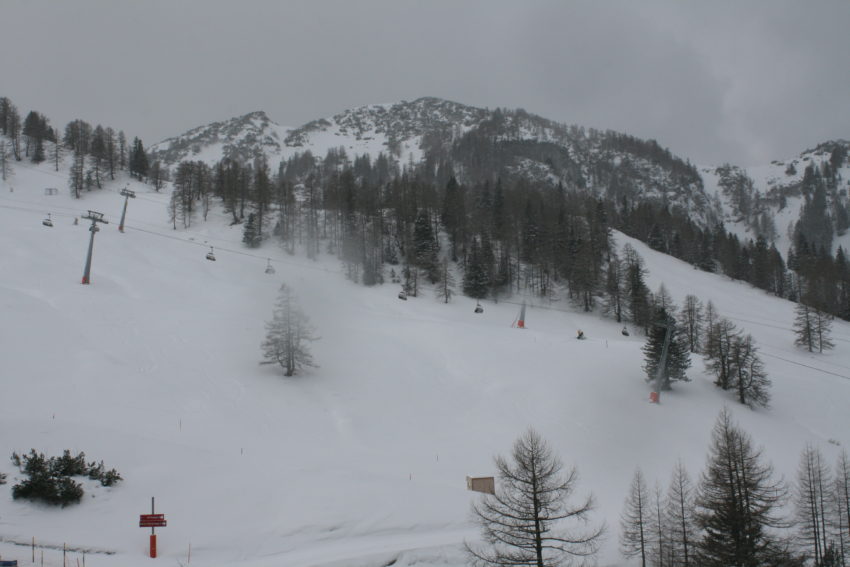
If there’s snow. Usually at this time it has a meter to two meters of snow. Tuesday there was about 10 centimeters. The mountain was closed. The lone chairlift went up and down the mountain without a single living soul, like a carnival fallen on hard times.
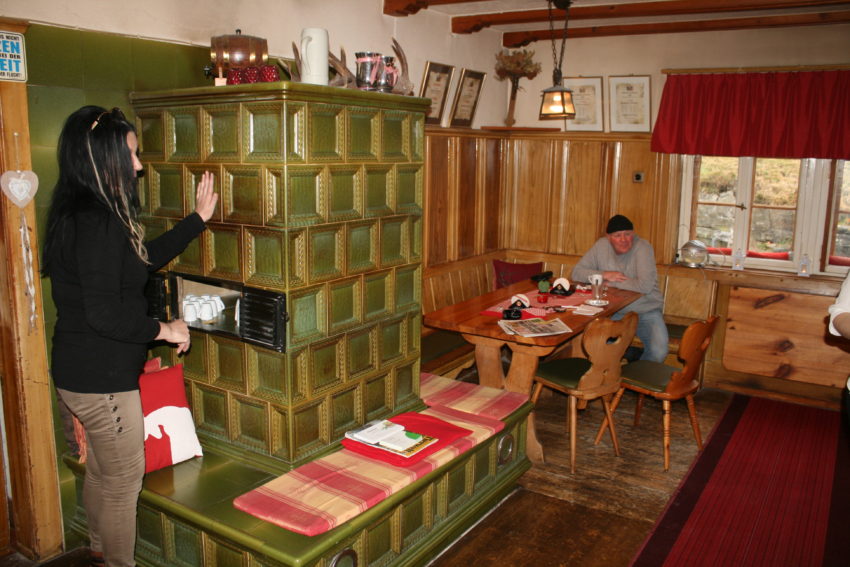
Instead we went to a little mountain cafe for a cup of coffee. Gashaus Hirschen Planken is old Alps. It has a big wood stove where a beautiful older woman in tight stretch pants and heeled boots brought in a big pile of wood. Her pretty, raven-haired daughter served me a cup of hot chocolate with fresh cream on top, perfect for a cold, drizzly morning.
The prince’s castle is on the drive down the mountain which is representative of how close he is to the people. You could be passing by the house of your Uncle Gus. Instead it’s the castle of the Prince of Liechtenstein. Every Aug. 15, he invites the entire country to the castle for a major party. He gives some speeches then lets everyone in the castle for free beer and wine. Imagine Obama inviting the American population to the White House.
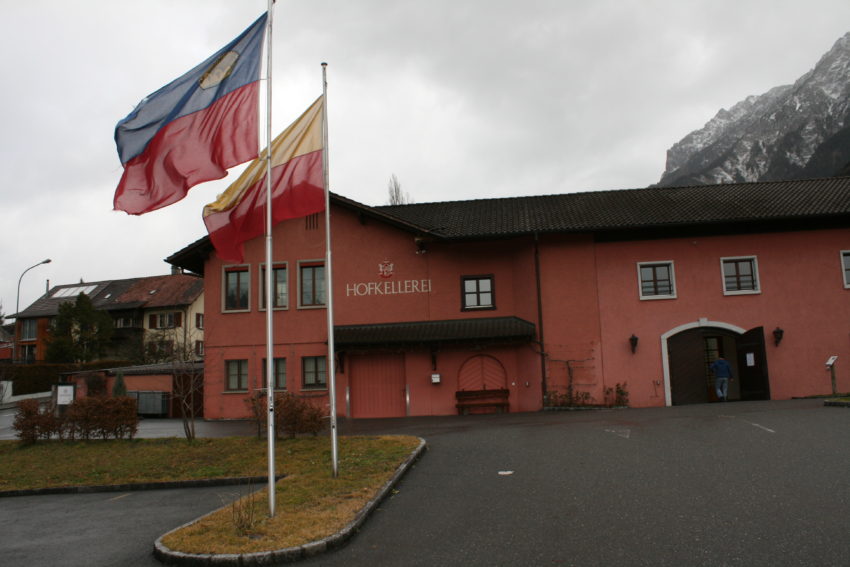
If you don’t see the prince on the streets, you can catch him and toast his country at his very own winery. Hofkellerei is open to the public and has wine tastings for 9 Swiss francs. (Has his own winery. Jogs through downtown. Lives in a castle. I want to party with this guy.) The big pink building has a sprawling tasting room and conference room, big enough for the prince to entertain foreign dignitaries. On this rainy day, Herbert had to yell up some stairs to find someone to pour me some wine. I was the lone customer. They gave me three tastings, all of Pinot Noir. As an Oregonian, I know Pinot Noir and this wasn’t bad. Considering Liechtensteiner is in the middle of the Alps I thought it strange a Pinot could be good here. But the woman behind the counter said the secret is the warm winds that come down the valley. It doesn’t freeze often here.
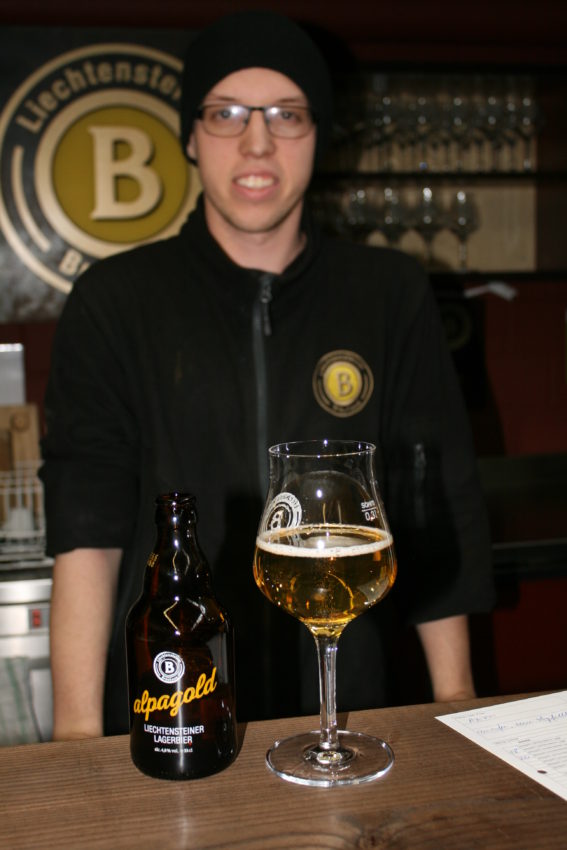
Besides wine, Liechtenstein has its own brewery. Liechtensteiner Brauhaus is in the Schaan, Vaduz’s other suburb on the north side. Brauhaus is small by brewery standards. It looked more like a regular bar when we parked on a side street and entered through the unassuming front door.
A young bespectacled kid in a black stocking cap stood behind a bar with four taps. He said Liechtenstein actually had a brewery in the early 1900s. But it closed and Liechtenstein didn’t have another one for 100 years until Brauhaus opened in 2007. It makes eight different beers, the highest a hefty 9 percent alcohol. I briefly met the owner, Bruno Guntensperger, who told me they export to Switzerland, Germany and Hong Kong. However, it’s limited because the beer isn’t pasteurized and only last six months. American commercial beer has the shelf life of Ivory soap.
The bartender gave me a bottle of Alpagold, a light lager of only about 4.5 percent. Ryan Tschol, 22, was born to a Canadian father and Liechtenstein mother who grew up speaking English and lived in Ottawa for four years. That explains why he spoke without a trace of a German accent. He’s serving an apprenticeship as a brewmaster but doesn’t know what he wants to do. He’d like to return to Canada. Liechtenstein is real slow for a 22-year-old.
I asked about small-town mentality. Does Liechtenstein have a small-country mentality?
“Somewhat,” he said. “There’s a lot of people who have it. But there’s also people who think outside it. It’s more of the older people. They’ve lived here pretty much all their life and don’t speak other languages.”
I asked what he liked about living here. He paused, longer than I ever would when someone asks me why I like living in Rome.
“Mountains,” he said. “Everything is nearby. In Canada, everything is far apart. I’m used to this place.”
So, again, I ask him what’s Liechtenstein’s biggest problem. Again, a looong pause.
“I couldn’t think of anything,” he said.
Looking for more answers, I found Liechtenstein’s Cheers. Mab’s, on the main drag in Triesen, has a square bar where an Austrian bartender served me, a German with his Liechtenstein girlfriend, an old Liechtensteiner and two older women sitting in a corner. Over another Alpengold I asked the bartender my mantra.
“What’s Liechtenstein’s biggest problem?”
She paused. Again. This time, the old man answered.
“There are no real men here.”
“Agreed,” said the woman.
I told her this place seems ideal.
“You won’t be here very long, will you,” she said. “If you did, you’d know.”
***
I’d been there three days and I already knew. Liechtenstein is so expensive, the locals go to Austria to buy goods. Numerous businesses in Liechtenstein have gone bust. Herbert once pointed out a big, darkened store.
“This used to be a big sports store,” he said, pointing in the dark. “But everyone went to Austria to buy for sport. It closed after one year.”
He said he bought a washing machine in Austria for 500 euro. Why? In Liechtenstein, the same machine cost 1,500 euro. Gas in Austria is 90 centesimi a liter; in Liechtenstein it’s 1.30 (about $1.20). On a 25-liter tank, the person would save 10 euros.
Nothing made me lose my appetite more than food costs. The cheapest pizza in a modest Italian restaurant called L’Osteria Alder was 17.50 Swiss francs. The house wine, a pitiful pour of about 3 ounces, was 6.80.
For a tourist, this is Liechtenstein’s biggest problem. I addressed this elusive question with Patrik Schadler, head of the country’s communications department. Schadler is a Liechtensteiner native who once worked as a ski instructor in Australia. In his late 30s with a mop of short curly hair, his mod green-rimmed glasses gave him an air of hipness you don’t see much among Liechtensteiners. His job isn’t easy. As a communications director, he must communicate to people what the hell Liechtenstein is.
“Two hundred kilometers away,” he said, “you have to explain where you are. Austria? 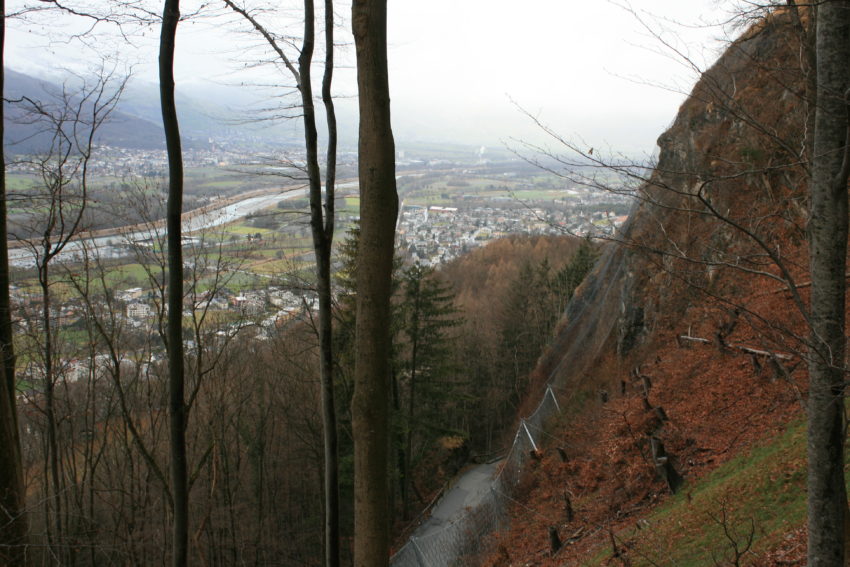
My first softball was, “What do you tell people about why they should come to Liechtenstein?”
“It is one of the smallest countries in the world but you can find anything like you can in a big country,” he said. “We have everything in this country. We have everything Switzerland has but in 160 square kilometers. We can drive up to the mountains now and we’re up there in 20 minutes and can go skiing. We can come back down and go to an art museum.”
Liechtensteiners have the same pride you see in tightly knit small towns. I saw that in San Marino. It’s wedged on a mountain near Italy’s Adriatic coast. It’s the oldest continuous republic and surrounded by Italy. They speak Italian. Yet they fiercely say they are NOT Italian.
Liechtenstein is the last monarchy in the Alps. It also is the only country in the Alps to survive World War II unscathed.
“It’s a miracle that we still exist in the middle of Europe,” Mischler said.
Mischler’s biggest struggle is to convince tourists to spend the night and not treat Liechtenstein as a mountainous souvenir store where you can get your passport stamped for three francs. About 65,000 tourists spend the night here but the number of day trippers is about 250,000-350,000.
“If you just come to Vaduz during the day, you’ll just see Chinese and Japanese people on the street,” he said. “If you come at night and go to dinner with a Liechtensteiner, you’ll see him say, ‘Hoy’ and ‘How have you been.’”
So, what’s Liechtenstein’s biggest problem. Pause. He was searching.
“We see problems around us,” he said. “We don’t have it here. The fear of the people here are those problems are coming to Liechtenstein as well.”
What problems? The biggest one facing Central Europe is immigration. Germany accepted 360,000 refugees from Syria. Liechtenstein accepted 15.
“But if you look at it by population, it’s the same proportion,” he said.
I walked away thinking Liechtenstein is a privileged place for a privileged few. But it’s definitely worth a layover, if nothing else to meet the privileged. On my last night after my long jaunt up the hill from getting fleeced for a pizza, I knocked on Herbert’s door to set up the morning’s pickup time to the train station. He invited me in and we had one last get together over Liechtenstein beer and Spanish wine. I went to my little fridge and brought up my two bottles from the brewery. Herbert, Ursi and I laughed and drank for an hour. It was one person from the most powerful country on earth and two people from a country that doesn’t have a single soldier. We found common ground in a paradise that is hidden away from the chaos all around it, like a cozy hut in the middle of a blizzard.
No matter how bad the storm is, Liechtenstein will always be warm.

